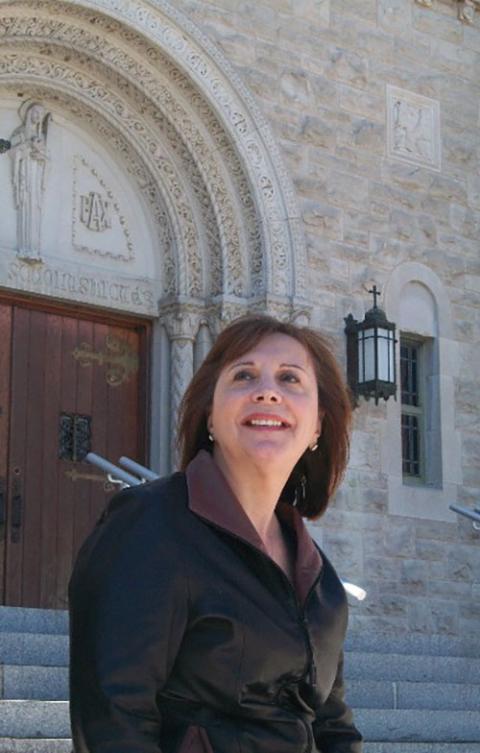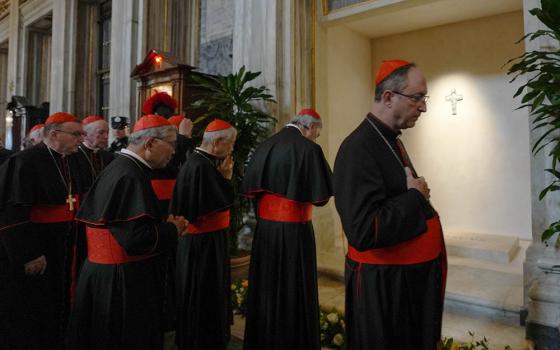
Like other religious congregations, the Mount St. Scholastica Monastery in Atchison, Kansas, has had to strictly limit visitors since the onset of the coronavirus pandemic in March 2020. The separation has particularly difficult because hospitality is a key Benedictine value. (Courtesy of Mount St. Scholastica, Atchison)
When I guide retreats for Benedictine Oblates — those who like me who are lay associates of a monastery — I often end by playing a song called "You Will Be Found" from the Broadway musical "Dear Evan Hansen." The song has become an anthem of sorts for young people yearning for a sense of belonging. The lyrics also beautifully capture the Benedictine spirit of community.
Even when the dark comes crashing through
When you need a friend to carry you
When you're broken on the ground
You will be foundSo let the sun come streaming in
'Cause you'll reach up and you'll rise again
If you only look around
You will be found
The promise that "you will be found" reminds those of us who are Oblates that we are part of an enduring, 1,600-year-old narrative. When we join the worldwide Benedictine community, we need never again feel alone. Indeed, that sense of belonging to something larger than ourselves is what first drew many of us to Benedictine life.
In the past, we were able to make regular visits to our monasteries, to pray with the monks and sisters, receive spiritual direction, and gather with other Oblates. Those encounters reinforced our sense of belonging. The pandemic upended all of that.
The separation has been equally hard on monks and monastic sisters because hospitality is a key Benedictine value. As one sister observed, a monastery without guests is like a table without food. Guests provide fresh perspectives that can invigorate a community, and that jolt of energy has been missing.
Like the rest of the country, Oblates have grown accustomed this past year to meeting on Zoom and connecting through email and social media. These methods help us communicate, but we are hardly "in touch" in the true sense. Without the structures we previously depended on, we've had to cultivate new understandings of our cherished Benedictine values of stability, community, hospitality, prayer and listening.

The separation and isolation of the pandemic has brought new awareness of surroundings, including, as the author writes, "befriending" nearby trees. (J. Alden Marlatt)
Oblates usually remain affiliated with the same monastery, a reflection of the vow of stability that monks and monastic sisters take. As someone who's lived in eight cities across two continents, I often struggled to understand the commitment to intentionally stay in one place. These past months of restricted travel have helped me to see another side of stability.
I've become reacquainted with the college town in central Illinois where I've resided for the past 15 years. I've gotten to know neighborhood children I'd never talked with before. I've befriended several nearby trees, observing their subtle changes from budding leaves in the spring to full bloom in summer to autumn colors and now bare branches.
I've gotten to know the excitable crows whose conversation awakens me at dawn. I feel such intimacy now with my surroundings that I can tell the time of day by the light streaming in through the windows.
Benedictine life at its heart is a blend of community, hospitality, silence and solitude. The first time my Oblate group met online last September, many of us with frenetic schedules said we welcomed the slower pace the pandemic afforded. However, for some Oblates who live alone, the silence had become all too deafening and the solitude achingly lonely. I was particularly moved by an Oblate who shared that she had not felt the touch of another human being in months.
Still, Benedictine life has survived and thrived by being adaptable. Old-fashioned letter-writing — one of the earliest forms of monastic communication — is enjoying a renaissance. Oblates send cards and notes to members of the monastic community, especially those isolated in the assisted living quarters.

The author at the door of St. Scholastica Chapel at Mount St. Scholastica in pre-pandemic time (Judith Sutera, OSB)
Since the pandemic began, my Oblate director at Mount St. Scholastica in Kansas has emailed a weekly "Monastic Missive" with a meditation on the Sunday Gospel, a poem to reflect on, and various prayer requests people have submitted. Though we can no longer give each other prayer support at in-person meetings, the Monastic Missive offers the chance to lift each other in prayer in our homes and through the readings we share.
Still, prayer has changed significantly. Like many Oblates, I went to daily Mass pre-pandemic. Because my husband has a preexisting condition, I now avoid any type of public gathering. This has meant a painful separation from the Eucharist. Yet I found that my prayer life has actually deepened. I intentionally set aside more time each day for silent, contemplative prayer.
Time away from a traditional parish has caused me to reflect more deeply on the meaning of church, a word whose origin in both Latin and Greek means to call out. Church for me now is more than a building. It is something vaster, more mysterious and significant that encompasses everyone around me.
The word sacrament has also taken on new meaning. I no longer think of sacraments as events largely mediated by ordained clergy, but as part of the call given to each of us to reflect God's grace in a tangible, human way.
Every time I sit down now at the dinner table with my husband, I am conscious that it is an occasion for Eucharist. Like the apostles on their way to Emmaus, we both experience the presence of Christ through the breaking of the bread. I trust that this broader understanding of Eucharist will remain with us even when we can return to Mass.
"Listen" is the first word of the Rule of St. Benedict and the practice of listening also comes with greater urgency. I used to try mightily to avoid long phone conversations that interrupted the workday. I now realize how important it is to stay with people on a call for as long as they need me — whether it's 10 minutes or an hour. This might be the only interaction they have with another person in the course of a week.
My monastery has also begun pairing "Oblate partners" who check in on each other regularly with emails, texts or phone calls. My partner lives in California in a senior community where socializing is still strictly limited. She knows she can contact me any time the loneliness becomes oppressive. It is our small way of fulfilling the promise of "You will be found."
Advertisement
We are finding other ways to fill the void in community. An Oblate in Weston, Vermont, began a Facebook page last fall called "Poems, Prayers and Practices" so Oblates could have a common place to share their poetry and display their visual art and handmade crafts.
Lectio divina, the slow, meditative, prayerful reading of Scripture and other texts is something Benedictines have always practiced. While it is possible to do on one's own, a certain collective wisdom emerges when we practice lectio with others. To address that need, an Oblate from Illinois hosts a weekly Tuesday morning lectio on Zoom, joined by Oblates from across the country. Together, we glean so much more from this communal prayer than we likely could alone.
There is more I would like to see, including Oblates organizing collective projects to address needs revealed by the pandemic. My Oblate group at Mount St. Scholastica responded last summer to a request from our sisters by donating home-sewn hospital gowns and masks for workers in their senior care facility. There are many other responses to pandemic-related needs that Oblate groups can take on.
The pandemic has underscored that our role must consist of far more than drinking from the spiritual well that our monasteries have traditionally provided. It has made clearer than ever that we need to be tireless actors conveying the Benedictine values of stability, community, hospitality, listening and prayer into a world that desperately needs these values. To all who are lonely and in darkness, feeling, as the song says, "broken on the ground," may the message of every Oblate be, "You will be found."







